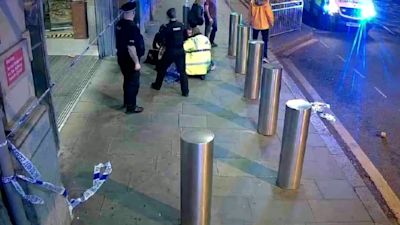Manchester Arena bombing victims were denied 'vital assistance', court hears

Vital assistance was denied to the dying and injured from the Manchester Arena bombing, the public inquiry into the May 2017 terror attack was told.
Fire crews with specialist equipment and training did not enter the City Room foyer where Salman Abedi detonated an explosion killing 22 people and the first fire engine did not arrive at the Arena until more than two hours later.
Police declared a marauding terrorist firearms attack some 16 minutes after the blast but did not inform the fire and ambulance services.
A similar omission happened a year earlier at a major training exercise involving a mock terrorist on the loose at the Trafford Centre and led to a 90-minute delay of fire and ambulance services arriving at that scene, the inquiry has heard.
Exercise Winchester Accord in May 2016 was labelled "a disaster" by inquiry chair Sir John Saunders as fire chiefs concluded that the police's focus was on "neutralising the situation rather than what the other agencies needed to do".
Giving evidence on Wednesday, Michael Lawlor, a senior national inter-agency liaison officer with Greater Manchester Fire and Rescue Service (GMFRS) said on the night of the bombing there were two specialist vehicles carrying 12 responders available in the event of a marauding terrorist attack.
The crews could have taken 10 stretchers to the City Room to assist moving casualties to a holding point before transportation to hospital and they also had equipment to treat the wounded and possibly stem bleeding, he said.
John Cooper QC, representing the bereaved families, asked him: "You accept don't you that there were not only lengthy delays as far as the deployment of fire personnel are concerned but in relation to specialist equipment it never even arrived at the Arena?"
Mr Lawlor said: "That's correct, sir." Mr Cooper said: "And that is very serious, isn't it?" The witness replied: "Absolutely, sir."
Mr Cooper went on: "The training your colleagues had, the equipment your colleagues had and the availability of resources that others such as the ambulance service might have been able to use, that just simply was taken out of the equation, wasn't it?"
Mr Lawlor said: "It was, sir."
Mr Cooper said: "I am in no way impugning brave individual men and women of your colleagues who no doubt would have wanted to be there providing their skill and care to stricken members of the public, you understand my criticisms don't lie there of course.
"But the fact of the matter is for some reason, and the chair will decide what, vital assistance to casualties, vital assistance to the dying was denied of them, wasn't it?"
Mr Lawlor replied: "That's correct sir."
Reports of gunfire came in after the explosion but were later proved wrong.
The inquiry has also heard that only one paramedic was at the City Room for the first 40 minutes after the blast.